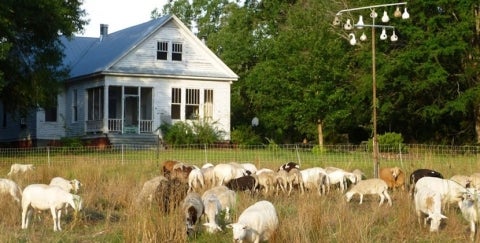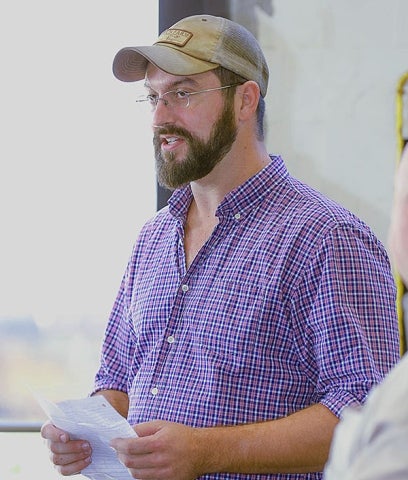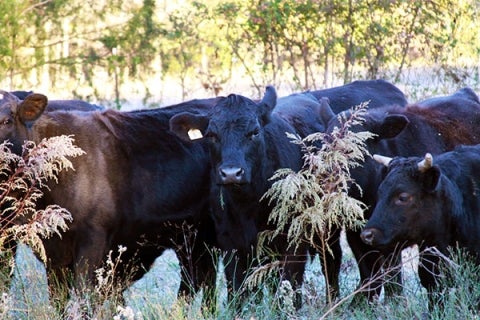Note: Yale School of the Environment (YSE) was formerly known as the Yale School of Forestry & Environmental Studies (F&ES). News articles and events posted prior to July 1, 2020 refer to the School's name at that time.
 Two Run Farm keeps its lambs in open pastures with their mothers to a healthy age.
Two Run Farm keeps its lambs in open pastures with their mothers to a healthy age.
Charlie Munford ’11 M.F.S. arrived as a master’s student in New Haven towing a flock of sheep behind his pickup truck.
He set them grazing in Southbury, Connecticut on a patch of land owned by Audubon’s Center at Bent of the River. The school year began. Munford became a full-time student and a part-time shepherd, checking his sheep on weekends and spending the summer doing research on the small pasture — spraying herbicide, burning plants, seeding native grasses, studying growth patterns in the wake of his sheep’s grazing. He laid a grid of PVC pipe in square-meter plots and estimated percentage and type of ground cover for each plot. In the end, contrary to his expectations, Munford found the work “incredibly tedious.”
 Charlie Munford
Charlie Munford
Until then, he had considered a future career in research. But the narrow scope of his summer work and a visceral aversion to statistics gave Munford a new orientation. After graduation, he reloaded his sheep, hitched up his trailer, and returned to the Mississippi farmland near the Big Black River that has been in his family for three generations.
Back home, Munford expanded his flock. His goal was to devise a more competitive and ecologically sustainable method of free-range sheep — and cattle — husbandry. The long-term question was how to raise a large number of animals in a way that helped the land. The short-term question was how to quickly fund the young operation. He answered the second question first: sell meat to restaurants.
Munford opened
Two Run Farm and started processing and selling meat wholesale to local restaurants. In the four-and-a-half years since, direct sales have grown rapidly, last year reaching $1 million.
The Times-Picayunecovered Two Run’s work in 2013 and the company now supplies some of the finest restaurants in New Orleans and Baton Rouge, including celebrity chef Emeril Lagasse’s flagship Emeril’s.
But while the meat processing business grew, Munford’s farming operation declined. The side project conceived as a temporary source of startup revenue took root as the central operation. Developing a reliable source of high-quality meat to match the demand was more important, Munford realized. Two Run expanded partnerships with other small Mississippi farmers who hold similar values. And about a year ago, when 175 acres of clover failed to reseed, Munford closed his sheep operation entirely, sold his ewes to a business partner, and bought a slaughterhouse and processing plant. This was a liberating moment, freeing them from contracts with other slaughterhouses
“Today, we’ve got our feet underneath us,” Munford said. The company’s core service of conditioning animals for slaughter, butchering them, and delivering them to restaurants is flourishing. Two Run has a well-established brand and employs eight people. And though Munford holds the company’s principles of local and humane husbandry sacrosanct — “I’m not changing the model,” he said — he sees room for growth without compromise.
 Munford’s Two Run Farm hand-picks individual animals to be included in the beef herd, rather than “simply selling everything that is born.
Munford’s Two Run Farm hand-picks individual animals to be included in the beef herd, rather than “simply selling everything that is born.
On the afternoon we spoke, Munford had just returned from Louisiana State University, where he’d dropped off a sample of dog food. The food is made from locally sourced, food-grade animal and vegetable products: beef liver, beef fat, Louisiana sweet potatoes. For some time it has been sold in small batches to local customers, and at LSU it was being lab tested for protein, fat, and moisture content. With the lab’s certification, Munford will be able to package the dog food and sell it retail. Two Run is also on track to become the first processing plant in Louisiana to accept wild hogs, which are “wreaking havoc on local crops,” Munford explained, and are typically shot and left for dead in the woods. He’s also looking to certify the plant for halal slaughter and is planning to incorporate bison into his supply.
Though his work has drifted from direct husbandry and he owns a house in New Orleans, Munford remains close to his family’s land. He maintains the farm that cradles childhood memories of fishing, hunting, and picking blackberries. He hopes to reintroduce quail on the property. But full-time farming, however appealing, is just one link in a lengthy chain of sustainable agriculture — and not necessarily the link that he wants to work on.
“I crave to make a bigger contribution,” Munford said. “And maybe that means we just keep growing in the thing we already do.”
 Two Run Farm keeps its lambs in open pastures with their mothers to a healthy age.
Two Run Farm keeps its lambs in open pastures with their mothers to a healthy age.
 Charlie Munford
Charlie Munford
 Munford’s Two Run Farm hand-picks individual animals to be included in the beef herd, rather than “simply selling everything that is born.
Munford’s Two Run Farm hand-picks individual animals to be included in the beef herd, rather than “simply selling everything that is born.